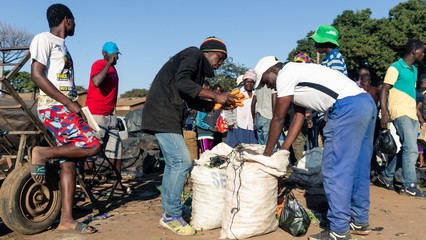In April, WFP wrapped up it’s Lean Season Assistance programme for the 2020/2021 season, after providing 1.5 million people with emergency food assistance at the programme’s peak.
WFP’s Small Grains project trained 160 Agritex extension workers and 60,357 smallholder farmers in 8 districts on climate-smart agricultural practices as well as monitored crops in 5 districts.
In it’s Urban programme in April, WFP commenced the baseline data collection for the Resilience Building component as well as a re-targeting process across 8 urban domains.
Spotlight: WFP Closes the Lean Season Assistance Programme 2020-2021 Cycle
Following a year of scaling up and confronting a myriad of challenges during the Lean Season Assistance Programme cycle, WFP is ending its delivery of emergency food assistance in Zimbabwe after helping meet the immediate food needs of the most vulnerable families in the country.
In the wake of 3 years of drought, rising hyperinflation and COVID-19, acute hunger had surged in Zimbabwe. So severe was the country’s food crisis that, for the first time ever, one WFP lean season assistance programme was immediately succeeded by another: that of 2019/20 ended on 30 June, months later than usual; and that of 2020/21 began on 1 July, months earlier than usual. After supporting the 550,000 of the most food insecure Zimbabweans in July, WFP gradually scaled up to provide 1.5 million in the country with food assistance at the peak of the lean season in April 2021.
In the face of the outbreak of the COVID-19 pandemic, WFP swiftly rolled out a riskcontrol measures at all food distribution points, significantly increased their number to prevent overcrowding and initiated handwashing and monitored social distancing in order to reduce the risk of exposure to WFP staff, its partners, other stakeholders and beneficiaries without disrupting the delivery of life-saving assistance.
The pandemic also brought along significant supply chain challenges that caused delays getting much-needed commodities into the country. On top of this, transporter strikes and the need to fumigate commodities further complicated WFP’s efforts. In response,
WFP mobilized to secure long-term solutions including keeping unsold Global Commodity Management Facility stocks within Zimbabwe and ensure they’d be readily available for the Lean Season Assistance programme’s rapid purchase in case of emergency.
As the lean season was set to peak the rains began, bringing heavy downpours and flooding in parts of the country. Even though this caused several WFP-contracted vehicles to get stuck in the mud, double distributions were conducted to mitigate delays during February and March and most districts were able to complete distributions within the calendar month.
WFP’s perseverance through these challenges proved essential to its mandate to save and change lives; an estimated 1.2 million out of the 3.1 million people who were facing stressed levels of hunger would have fallen into crisis were it not for the food assistance they have received from WFP and its partners.
Post published in: Featured


